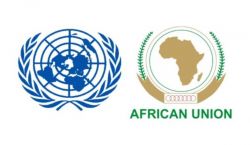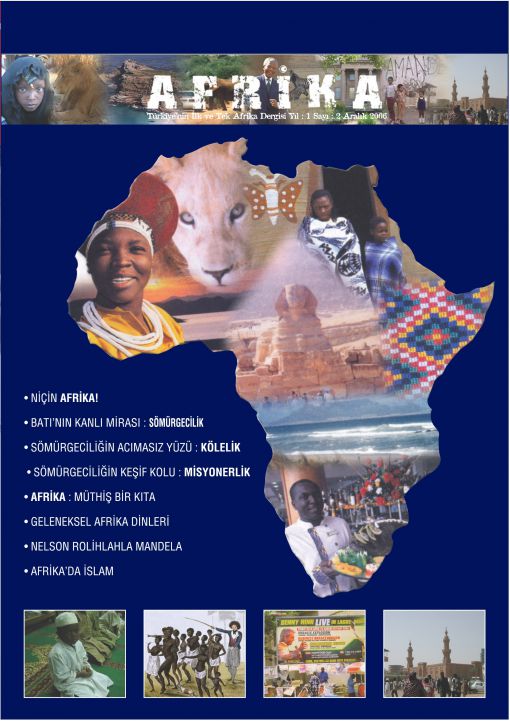
UN AND AFRICA AFTER 75 YEARS  Head of African Center for Strategic Studies, Mustafa Efe, evaluated the relations of African countries with the United Nations (UN) and their criticisms of the UN order to the AA Analysis Desk. Although 75 years have passed since its establishment, the activities and institutional structure of the United Nations still continue to be discussed. The African continent countries, where one out of every four countries represented in the UN, are also in serious questioning about the UN, which does not have a mechanism to produce any solution to bitter experiences such as colonialism, slavery, civil wars, epidemics, drought and hunger.
No African country is a member of the UNSC
The African continent countries, where one of every four countries represented in the UN, are in serious questioning regarding the UN. On April 25, 1945, when the UN was established, 850 representatives from 50 countries came together at the San Francisco Conference and gave its final shape to the treaty consisting of 111 articles, and the treaty was unanimously accepted on 26 June 1945. However, only 4 African countries were present at these meetings: Ethiopia, Liberia, Egypt and the Republic of South Africa. Among these countries, Ethiopia and Egypt were able to speak a little. The Republic of South Africa, on the other hand, was a country under the British Governor as the Union of South Africa. Liberia was also a country like the USA, which was sent back to Africa from the USA because of industrialization and was founded with "liberated slaves", and it was not in a position to speak.
As African countries gained their independence over time, they became members of the UN and began to see this organization's platform as an opportunity to bring issues such as economic development and colonialism to the fore. Currently, none of the 54 states from the African continent, which constitute the largest regional grouping in the UN, are permanent members of the UN Security Council (UNSC). As long as this structure of the UN continues, it is obvious that they will not be. None of the 54 states of the African continent, which constitute the largest regional grouping in the UN, are permanent members of the UNSC. Independence of African countries and the UN After the establishment of the UN and the adoption of the UN Charter in 1945, various peoples in Africa have gained awareness of their fundamental rights and have felt empowered in their struggle for self-determination. In the first period of its establishment, the Trusteeship Council, which legitimized the colonial activities of the colonial states in the African continent, and the international tutelage system were brought under the umbrella of the UN, and mandate administrations were established for the administrations of the countries under protection.
1960 is an important year for both Africa and the UN. In September 1960, 17 new states were admitted to the UN, 16 of which were from Africa. Also in 1960, the General Assembly adopted the "Declaration of Independence of Colonial Countries and Peoples"[1], an important document stating that all people have the right to self-determination and declaring the need for a swift and unconditional end to colonialism . In fact, this declaration was requested by the USA, which wanted the abolition of colonialism when it could not enter the African market due to colonial administrations. Even though there are many decisions about Africa in the UN, African countries have little involvement in these decisions. Africa is not spoken to Africans The UN General Assembly provided a forum where African countries could find their voice and support for their demands. In this process, of course, they were not in a position to voice an issue such as the UNSC membership of African countries. But the post-colonial period was a difficult time. The newly independent states lacked strong democratic institutions and became centers of civil conflicts in which rival ethnic, religious, or other groups fought for power and access to resources.
On the other hand, speaking with a common voice at the UN is always a problem. The speeches of African leaders, who did not even defend the rights of their own people, on the issue of defending the rights of Africa, could not go beyond a colorful image. Despite all this, African leaders made good use of the UN platform and gave epic speeches at UN General Assembly meetings. Zimbabwe President Robert Gabriel Mugabe, South African President Nelson Rolihlahla Mandela, Libyan President Muammar Gaddafi.
The failure of the UN to prevent civil wars and genocides in countries such as Somalia and Rwanda paved the way for the interventionism of countries with a good record such as the USA and France. Today, although there is a lot of talk about Africa in the UN, it is striking that Africa is not talked about. Although many decisions are taken regarding Africa, African countries have little involvement in these decisions.
UN activities in Africa It is a fact that there are dozens of UN agencies on the African continent. When the UN's regional, country offices and partner institutions and organizations are taken into account, an incredible list and budget emerges.
Many international official organizations have country or regional offices in Africa. Most of the UN's socio-economic and humanitarian studies activities are in Africa. UNESCO, which has been working in cooperation with Africa for many years, has always defined such cooperation activities as its main priority. In this context, one of the two global priorities accepted by the member states for the medium-term period of 2014-2021 was the “Africa Priority”.
African countries and Africans could not take on many tasks in the first years of the UN's establishment. After the end of the Cold War and the shift of the power struggle towards Africa, it can be said that African countries and Africans began to be taken into account. Two general secretaries have emerged from Africa so far. These are the Egyptian Boutros Boutros-Gali and the Ghanaian Kofi Annan. Both served in critical periods (1992-2006) after the Cold War.
UN Mission Forces In addition to these, the UN carries out many of its activities in Africa with various mission forces. The first peacekeeping operation on the continent was established on 14 July 1960 in Congo, with UNSC Resolution 143 of UN Operation (ONUC).[2] Also, between 1948-2019, 40 percent of UN Peacekeeping missions (26 out of 63 missions) were in Africa.
However, it is known that Africans do not approach UN missions positively due to corruption, rape and dirty relations involving UN officials, such as demonstrations against the UN Peacekeeping Mission in the Central African Republic (MINUSCA) in many countries where UN Peacekeeping missions are deployed.
"dead aid" to Africa Another prominent issue regarding Africa is the aid activities carried out to the continent within the UN body. If the UN is going to carry out aid work in Africa, the aid materials to be made are purchased from the companies of Western countries. Therefore, what is done under this development aid is called "Dead Aid". Although some activities carried out by the UN are expressed under the name of "sustainable development", unfortunately, in reality, they can be referred to as "sustainable retardation and dependency". 95 percent of aid organizations that go to African countries from Western countries go to Africa to make them needy, to sow seeds of discord, to cause instability and sometimes to Christianize it.
UN failed to prevent genocides Africa is a continent that has witnessed painful genocides in recent history. The role of the UN here has also always been questioned. Because the UN failed to prevent genocides in Africa. For example, while the Rwandan Tutsi Genocide continued, the international community's various criticisms of the UN came to the fore. In Kigali, thousands of people who took refuge in the Ecole Technique Officielle school, where the Belgian soldiers of the UN were settled, were killed in front of their eyes after the soldiers were removed. The UN has completely failed here. Moreover, it was reflected in many international reports that the soldiers of some Western countries, especially France and the Netherlands, serving under the UN, were involved in the genocide. It was seen that the UN "prayed for peace and preached for war" in Africa, so to speak.
The failure of the UN to prevent civil wars and genocides in countries such as Somalia and Rwanda paved the way for the interventionism of countries with a good record such as the USA and France. In addition, it brought the bankruptcy of paradigms and schools that established their theoretical framework on the approach of "the role of international organizations is gradually increasing" in international relations theories.
[Mustafa Efe is the head of the African Center for Strategic Studies (AFSAM)]
|
|
1132 kez okundu
YorumlarHenüz yorum yapılmamış. İlk yorumu yapmak için tıklayın |





